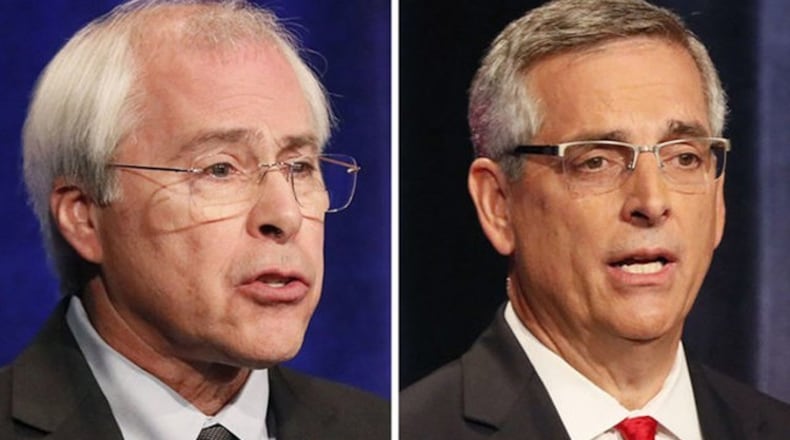Georgia voters will have a fresh chance Tuesday to decide who they want in charge of state elections after a race for governor rocked by voting suppression allegations. And they'll get an opportunity to pick a member of the state's regulatory agency in a contest that's shattered spending records.
Tuesday's runoff pits Democrat John Barrow against Republican Brad Raffensperger in the race for secretary of state, a contest for an open seat that pits two dueling approaches to the voter cancellations and long lines that drew national attention last month.
And two-time Republican incumbent Chuck Eaton faces Democratic businesswoman Lindy Miller in the race for a seat on the Public Service Commission, a typically low-profile election that's attracted millions of dollars in spending and stoked a new debate over the viability of the Plant Vogtle nuclear facility.
The polls are open Tuesday from 7 a.m. to 7 p.m. You can find your voting site here.
Beyond the policy issues, Tuesday's vote will speak volumes about Georgia's politics, too. Republicans usually have the edge in fall runoffs, which turn out an older and whiter electorate. But Democrats eager to avoid another clean sweep are desperate to claim their first foothold in statewide office since 2010.
The runoff is needed because no candidate in either race won a majority of the votes, with Libertarians earning a few percentage points in both contests. Eaton narrowly missed the mark the majority-vote margin, while Barrow trailed Raffensperger by less than 1 percentage point.
Here are six factors that are shaping the runoff:
Low-energy race: Remember the record turnout that made Brian Kemp and Stacey Abrams the two top gubernatorial vote-getters in Georgia history? Well that seems like a distant memory now. About 400,000 voters cast early ballots – one-fifth of the general election tally – and the runoffs are getting just a fraction of the attention that the state's hotly-contested general election earned. This type of low-turnout affair will hinge on a candidate's ability to drive core voters to the polls.
Voting rights. The contest assures that the debate in Georgia over ballot access remains front-and-center – not that it was in danger of losing steam. Barrow wants to keep Georgia's photo ID laws but make it more difficult to cancel someone's voter registration. Raffensperger aims to mostly maintain Georgia's current election process and vows to combat potential voter fraud, which is extremely rare in part because of the requirement for voters to show photo ID. Add to that mix a far-reaching lawsuit filed last week by Abrams' new voting rights advocacy group that seeks vast changes in the election system.
Politics, politics. Barrow, a former U.S. congressman, prided himself on winning five terms as a centrist as his east Georgia district grew increasingly competitive. Now he's trying to rev up Democrats in an era where Abrams and other progressives dominate the party. Raffensperger is sticking to many of the conservative issues that Brian Kemp embraced when he was secretary of state, though he's running a far lower-profile campaign that included skipping the only televised debate of the runoff.
Vogtle fallout. One of the biggest debates in the PSC race involves the troubled Vogtle nuclear project, whose costs have doubled to nearly $27 billion and is set to be five years behind schedule upon completion. Miller has criticized Eaton's failure to put "meaningful incentives" to finish the project quicker. Eaton claims he's protected utility ratepayers and that Miller doesn't understand the commission's role.
Cash money. Democrats far outraised their Republican opponents in the four-week campaign, with both Barrow and Miller taking in about twice as much as Raffensperger and Eaton. That cash has fueled a wave of TV ads, digital spots and glossy mailers in both contests. Then there's the more shadowy spending from a Washington-based nuclear power group that spent about $1 million to support Eaton's candidacy.
Polarized politics. The early-voting numbers tilt toward Republicans, showing a far older and whiter electorate than just a month ago. Republicans hope President Donald Trump's endorsement of Raffensperger on social media helps to further energize conservatives. Democrats retained some of the grassroots canvassers who crisscrossed the state ahead of the November vote, and aimed for liberals furious with Kemp's refusal to resign during the race. Barrow, meanwhile, returned to his old congressional district to pump up voters, traveling from Savannah to Augusta to Athens on an election-eve Jeep tour.
About the Author
Keep Reading
The Latest
Featured






